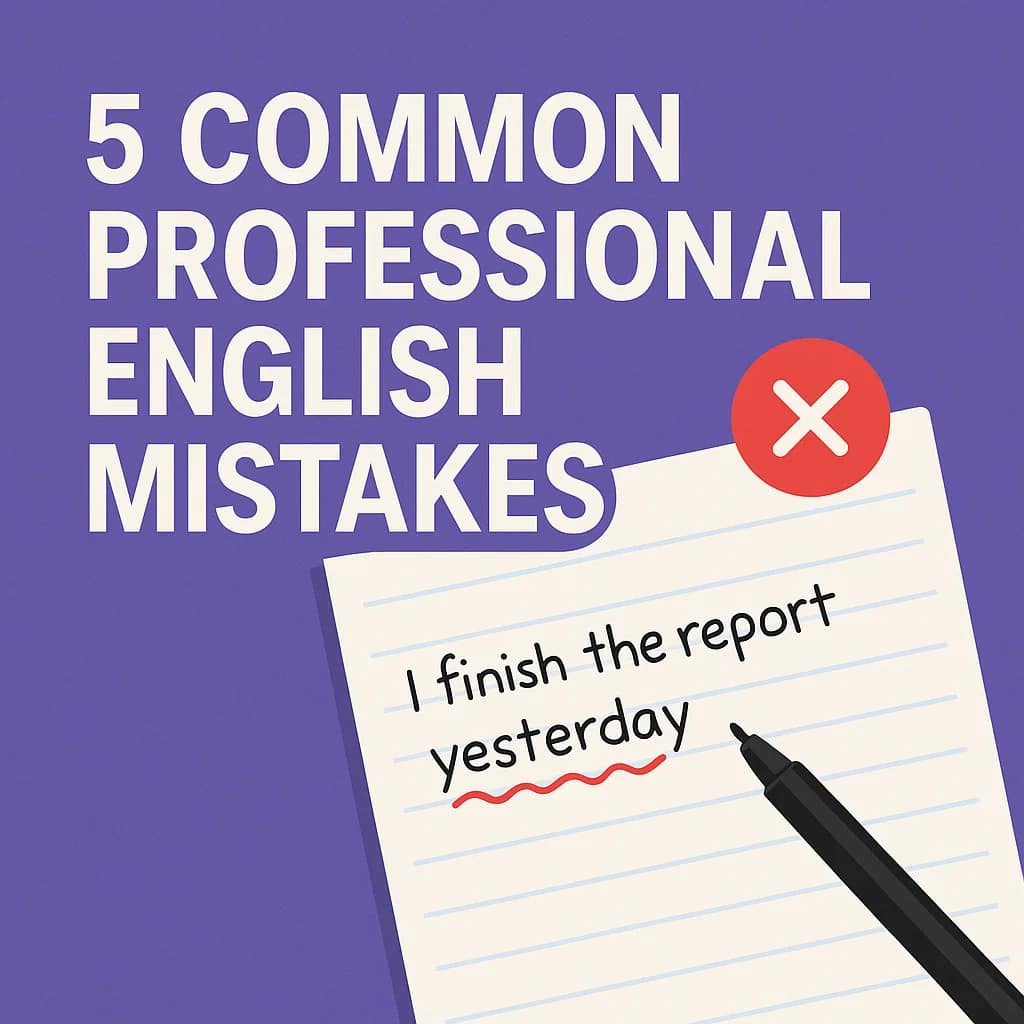
Introduction
If you use English at work, you know that even a small mistake can have a big impact. Professional English mistakes can lead to misunderstandings, make you sound less professional, or even cause you to miss out on job opportunities.
The good news is that most of these mistakes are easy to avoid once you’re aware of them. In this article, I’ll show you the five most common ones and how to fix them effectively.
1. Using the wrong verb tenses
One of the most common mistakes when writing emails in English is mixing up verb tenses. For example, many people write:
Incorrect: I finish the report yesterday
Correct: I finished the report yesterday
How to avoid it:
Practice the difference between the simple past, present perfect, and present simple. A basic rule: if the sentence includes a specific time word like yesterday or last week, use the simple past.
2. Writing sentences that are too literally translated
Many professionals write sentences like:
Incorrect: I write to you to ask…
This often happens when people translate directly from their native language. In professional English, this sounds outdated or unnatural.
How to avoid it:
Use native-sounding expressions such as:
- I’m reaching out to ask…
- I’d like to know if…
- Could you please let me know…
Tip: Keep a personal list of useful business phrases to refer to when writing.
3. Being too formal or too informal
It’s easy to sound either too stiff or too casual. For example, writing Hey! in an email to a client may come off as unprofessional, while starting an internal message with “To whom it may concern” might feel overly formal.
How to avoid it:
Adapt your tone to the context.
For new contacts or senior colleagues, try:
- Dear Mr. Smith
- I hope this email finds you well
For coworkers or teammates, it’s fine to use:
- Hi James
- Hope you’re doing well
Related article: Essential Phrases for Writing Professional Emails in English
4. Confusing false friends (similar words with different meanings)
False friends are words that look similar in two languages but have different meanings. Here are some common examples:
- Incorrect: Actual = current
Correct: Actually means in fact, not currently - Incorrect: Assist = attend
Correct: Assist means to help
How to avoid it:
Create a short list of commonly confusing words (false friends) and review it before sending emails or proposals. This can help you avoid embarrassing or confusing mistakes.
5. Using vague or indirect language
In Business English, clarity and directness are essential. A phrase like:
(Incorrect) “I hope we can do something about this” does not clearly express what action should be taken.
How to avoid it:
Use specific, action-oriented phrases such as:
- I propose we schedule a meeting
- Please confirm your availability
- Let me know by Friday
Tip: Writing clearly demonstrates professionalism—especially in multicultural and remote work environments where precise communication is critical.
Conclusion
Avoiding these professional English mistakes won’t just improve your writing—it will also strengthen your image as a competent and reliable professional. You don’t need perfect grammar; what you need is accuracy, clarity, and regular practice.
Recommended next step:
If you want to improve your Business English even more, review your LinkedIn profile in English. Make sure it reflects your true value as a professional.
Related article: LinkedIn in English: How to Optimize Your Profile for Global Opportunities
